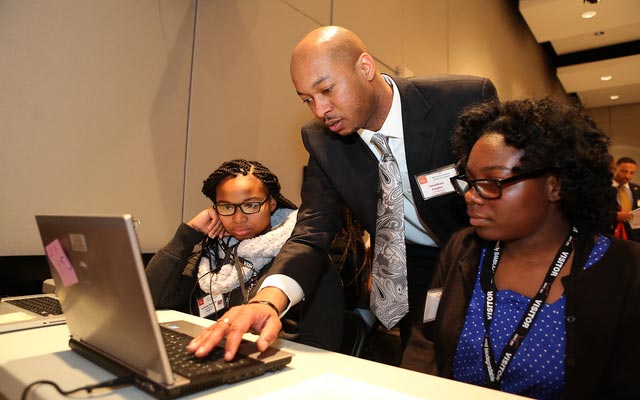Full Transparency
Our editorial transparency tool uses blockchain technology to permanently log all changes made to official releases after publication.
More of our content is being permanently logged via blockchain technology starting [10.23.2020].
The greatest opportunities in the future will be high-tech jobs in science, technology, engineering and math. Despite this potential, however, STEM fields lack diversity.
Only 18 percent of women graduate from college with a computer science degree. For women of color, these numbers are even lower. African-American women make up 3 percent of students graduating with a computer science degree. Latinas and Native American make up less than 1 percent.
Despite these troubling statistics, more voices are calling for action to reverse this trend. One such voice is that of Black Girls CODE – a nonprofit that Verizon is proud to partner with in 2015.
1 Million Girls of Color to Code by 2040
Black Girls CODE teaches young girls of color – ages 7 to 17, from underrepresented communities –how to build the applications and programs they use daily. The nonprofit provides instructional coaching in Web design, robotics, gaming, mobile app development and more through workshops, “hackathons” and after-school programs.
Black Girls CODE has already served over 3,000 girls across seven U.S. chapters and internationally in Johannesburg, South Africa. Aspiring to teach 1 million girls of color to code by 2040, the nonprofit has plans underway to: expand community outreach to 15 U.S. cities, increase the number of class offerings throughout the year and serve an additional 3,000 participants.
Seeding Diversity in Tech
In partnership with Verizon, Black Girls CODE will be launching two new chapters in the underrepresented communities of Washington, D.C., and Raleigh-Durham, North Carolina.
To help spur interest in STEM, Verizon employees will volunteer their time to help shape and teach the curriculum to young girls and help recruit all-star girls into the Black Girls CODE community.
Together, Verizon and Black Girls CODE are changing the image of what it means to be a techie and seeding diversity in the lucrative fields of STEM.
Black History Month – Youth Summit
Kicking off its Black History Month celebrations, Verizon hosted a coding workshop for 60-plus students on Feb. 3. Students from local STEM schools received hands-on experience in coding and creating mobile applications with the help of instructors. Later in the day, employees gathered for a panel with Verizon leaders. The session was focused on the social and business benefits of engaging underrepresented groups in STEM.

Jonathan Fowler, manager of Mid-America operations at Verizon, guiding students on coding activities.